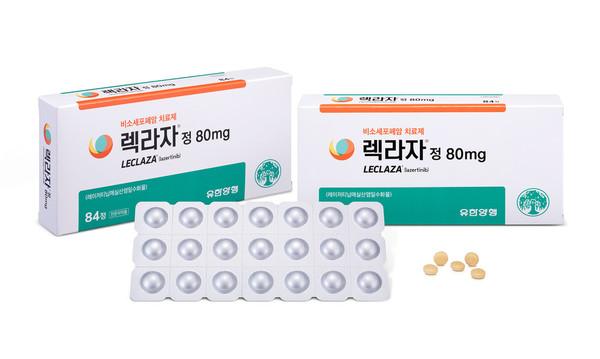
Leclaza, Yuhan Corp.’s homegrown third-generation EGFR mutation-targeted therapy seeking global advances, has also demonstrated that it is effective on patients whose lung cancer has metastasized to the brain.
The result of a sub-analysis that separately analyzed the effectiveness of Leclaza’s first-line treatment of brain metastases was presented at the European Society for Medical Oncology Annual Congress (ESMO Congress 2023) in Madrid on Oct. 22.
It was also published the same day in the Journal of Thoracic Oncology (JTO), the International Association for the Study of Lung Cancer (IASLC) official journal.
The analyses were limited to patients with brain metastases included in the LASER301 trial, which was the basis for Leclaza's first-line approval. Of the 393 patients with advanced EGFR-mutant NSCLC enrolled in the LASER301 trial, 86 with measurable or non-measurable central nervous system (CNS) metastases were analyzed for the effectiveness and safety of REKLARZA. The study randomized 45 patients to receive 240 mg of Leclaza and 41 in the control arm to receive 250 mg of gefitinib (Iressa).
The published analysis confirmed a median intracranial progression-free survival (miPFS) of 28.2 months in the Leclaza arm and 8.4 months in the gefitinib arm. In patients with measurable intracranial lesions, the intracranial objective response rate (iORR) was also higher with Leclaza at 94 percent vs. 73 percent with gefitinib.
Median intracranial duration of response (miDOR) was not reached (NR) with Leclaza and 6.3 months with gefitinib. Tolerability was similar to the overall LASER301 study population.
"The proportion of patients with EGFR-mutated NSCLC that have already metastasized to the cranial cavity, including the brain, at the time of diagnosis is not small, and the prognosis is poor, so there is a high demand for treatment. However, there have been few proper treatment options,” Professor Lee Se-hoon of the Department of Hematology/Oncology at Samsung Medical Center said.
First- and second-generation EGFR-targeted therapies have relatively low blood-brain barrier (BBB) permeability, making it difficult to achieve significant brain metastasis effects. Before Lexarza, there was only one third-generation therapy, Tagrisso. So options were limited, he added.
"Leclaza is a third-generation option known for its high blood-brain barrier permeability. It showed superior effectiveness in the second-line treatment of brain metastasis and remarkable results in the first-line treatment,” Professor Lee said.
Adding an effective third-generation option is welcome as it increases treatment options for patients with stage 4 brain metastases with limited options, and the median intracranial progression-free survival was more than three times higher than the control group, which is very encouraging, he added.
On June 30, Leclaza won approval from the Ministry of Food and Drug Safety for the first-line treatment of patients with locally advanced or metastatic NSCLC with EGFR exon 19 deletion or exon 21 (L858R) substitution mutation. On Aug. 30, it passed the sixth meeting of the Serious (Cancer) Disease Review Committee of the Health Insurance Review and Assessment Service (HIRA), raising expectations of reimbursement for first-line treatment in Korea.
On Oct. 13, the 11th Pharmaceutical Benefits Evaluation Committee also approved the appropriateness of salary for the indication of “first-line treatment of patients with locally advanced or metastatic NSCLC with EGFR exon 19 deletion or exon 21 (L858R) substitution mutation'.” Negotiations with the National Health Insurance Service and a decision by the Health Insurance Policy Review Committee are the only remaining steps before the reimbursement standard is announced.
Related articles
- Yuhan's Leclaza aims to enter US market based on MARIPOSA study’s success
- [ESMO 2023] Yuhan's NSCLC drug Leclaza shows potential as 1st Korean blockbuster drug
- 'We're seeing more weapons in the battle against lung cancer'
- Yuhan secures full approval for Leclaza as 1st-/2nd-line treatment for NSCLC
- Tagrisso, Leclaza get reimbursement for 1st-line NSCLC treatment
- Yuhan’s lung cancer drug Leclaza takes first step into global market

